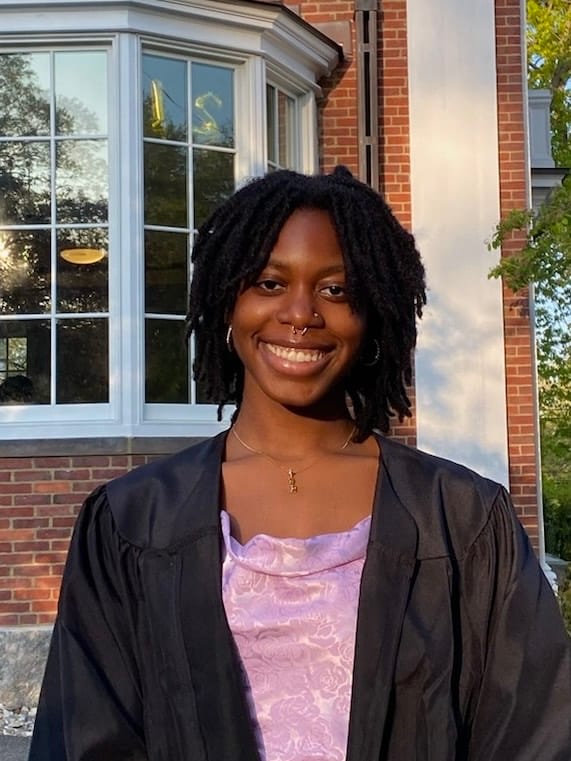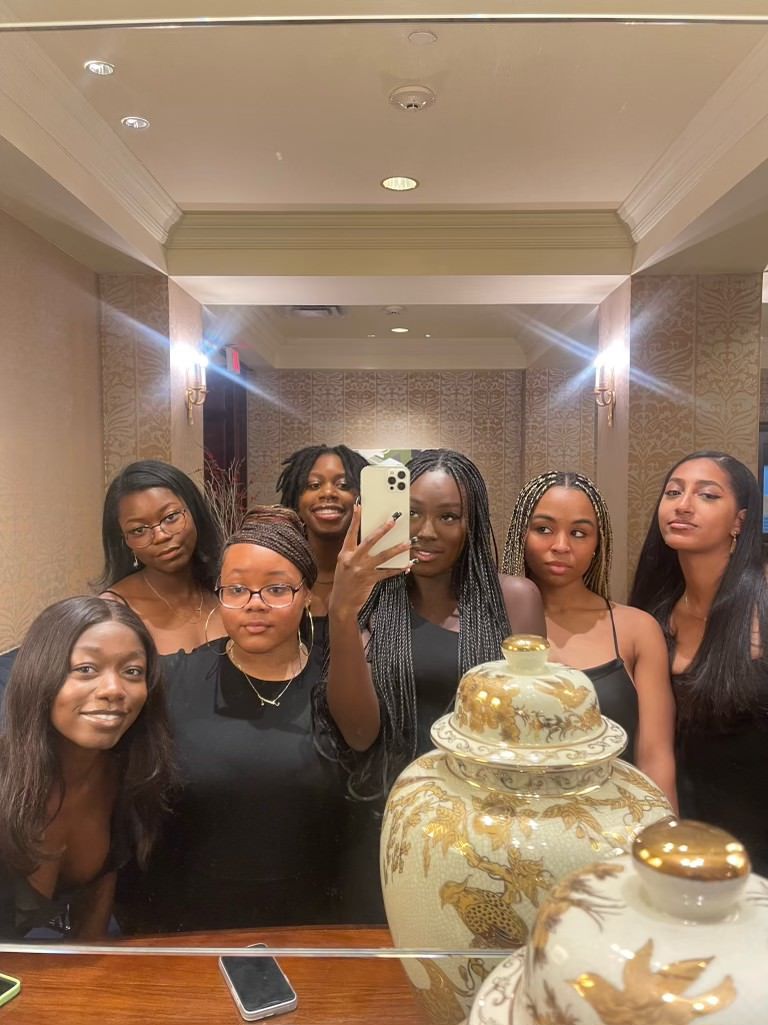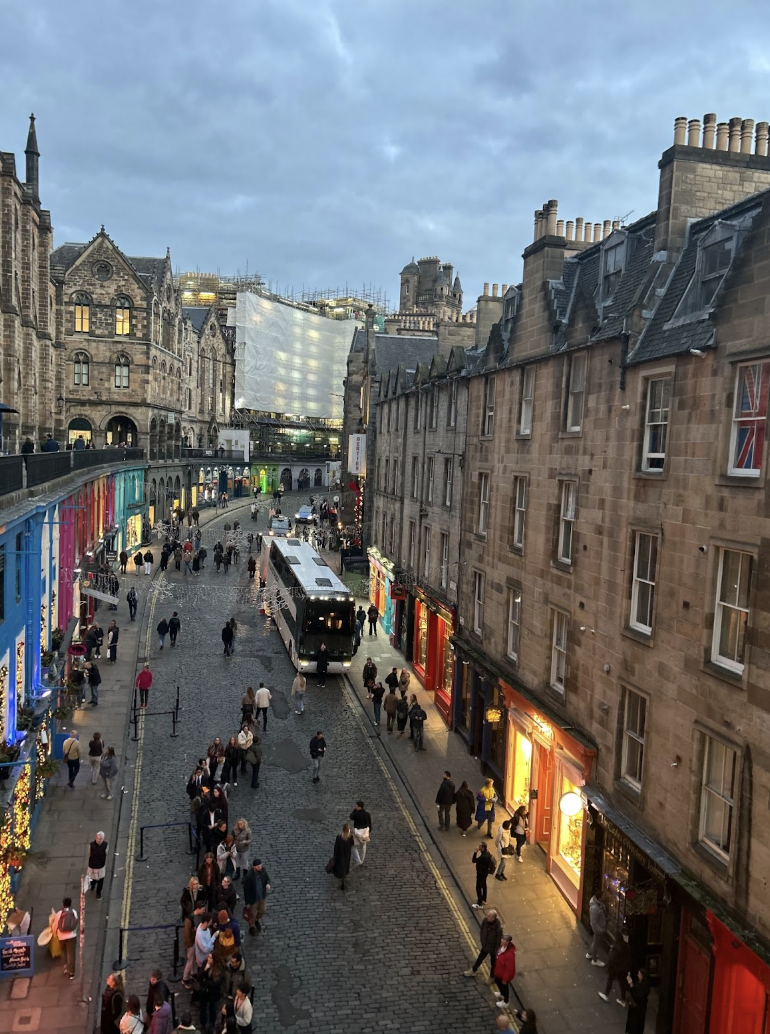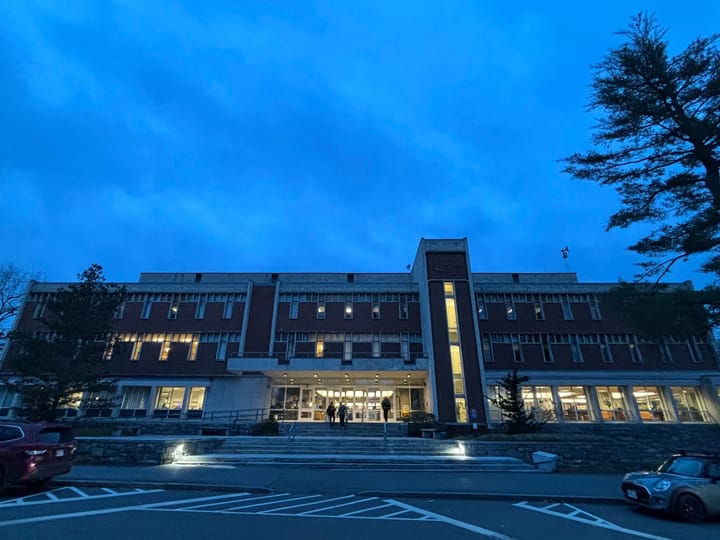Sika Essegbey: A Quiet but Powerful Voice
Understated by nature, Fulbright winner Sika Essegbey has nevertheless left an important mark in her time at Amherst — as a campus leader, a scholar, and a friend.

By her own admission, Sika Essegbey ’23 is an introverted person. But her understated demeanor belies an unceasing dedication to helping others feel at home. In her time at Amherst, Essegbey has left an indelible mark — one of genuine care — both inside the classroom and out.
Essegbey, who double-majored in Black studies and Spanish, has been both an advocate — serving as a perennial leader of the Black Student Union (BSU) — and a capable scholar: In recent weeks, she earned an English Language Teaching Fulbright, which will take her to Colombia, where she will be able to pursue her interest in teaching.
Despite her introversion, Essegbey’s contributions have not gone unnoticed.
According to her academic advisor, Professor of Spanish Sara Brenneis, Essegbey is “a really compassionate and empathetic person. Soft-spoken, but somebody who has a lot of passion and a lot of intellectual capability.”
Essegbey’s friend Anu Daramola ’24 put a similar sentiment in somewhat different words. “She underestimates herself, and then she still ends up blowing expectations out of the water,” Daramola said. “And she’s just a bad bitch. That part, too.”
Essegbey’s time at Amherst has been one of growth. And now, she’s determined to ensure that her voice, though it may be quiet at times, is heard — no matter what language she’s speaking.
Encountering Cultures
Essegbey hails from Gainesville, Florida, and both her parents, who are immigrants from Ghana, work at the University of Florida (UF). Specifically, her father is a professor of African studies.
Her parents kept the young Essegbey connected to a “strong community” of Ghanaian and other African people. But her school life was a different story.
“It was kind of a weird dynamic, because it [was] a magnet program inside of a predominantly black school,” she said. “And so it operated in almost like a segregated way, which is something I always noted.”
This realization would inform Essegbey’s later interest in education. “I had always questioned those dynamics,” she added. “It didn’t make sense to me how it was allowed for a school to be set up like that.”
Nevertheless, Essegbey was able to meet lots of different types of people outside of school, through her parents’ connection to UF, which she explained “brings in people from everywhere for all the different departments.”
Her family also brought a diversity of different cultural experiences. Her father, in addition to being a Ghanaian immigrant, had lived in the Netherlands and Norway, and her uncle spoke Russian.
Essegbey’s early life was also deeply influenced by father’s career as a professor. Although her dad can be shy, Essegbey said, “He’s also very welcoming.” She recalled being inspired by the close bonds he formed with his students, who he’d sometimes have over for dinner.
But her father gave her a surprising piece of advice: “‘Don’t teach. Don’t ever teach,’” Essegbey recalled. “‘You’ll make no money.’” She noted with a laugh that all of her internships have been teaching-related.
When it came time to select a college, Essegbey knew she wanted something different. She was primarily interested in small colleges far away from her home in Florida. And when she got accepted to Grinnell College, in Iowa, she was excited, although a little bit nervous about the rural location.
But when the Amherst acceptance came in, the conclusion was immediate: “I was like, ‘Yeah, I’m not going to go to Iowa,’” she said, laughing. “Out of all the options,” she added, “[Amherst] was the best one.”
Finding Freedom
After first arriving at Amherst, Essegbey was “really, really nervous,” she admitted. “I was really stressed about meeting people and about making friends.”
These fears came to a head during her orientation trip to “Vermont or New Hampshire,” during which, to Sika’s surprise, temperatures got down to the low 50s, even though it was summer. “I was severely underprepared,” she said.
The upside, though, was that she was able to make many friends while ziplining and canoeing. “It was a lot of freedom for the first time,” she said. “I had so much fun.”
Part of the appeal of being at college was that she was able to build close connections to people who shared her identities. For instance, in the second semester of her first year, Essegbey and other Black students attended a Black Solidarity Conference at Yale University.
“I met a bunch of Black students from other colleges in the Northeast,” she recalled. “They had a bunch of events; they had a bunch of panels. I got Chick-fil-A for the first time in months. It was really nice.”
But Essegbey soon found herself losing the freedom she had grown to appreciate. The pandemic struck during her first-year spring, and everyone was sent home. “It was really difficult,” Essegbey said.
Even upon returning to campus, the environment — with masking mandates, limited social opportunities, and online classes — was a very different one than she had left.
“We had to get really creative and innovative in the ways that we had fun,” she said. Nevertheless, Essegbey said she was still able to build bonds and enjoy her classes.

Talking the Talk
Even though Essegbey would take, at various times, courses in four different languages — including French, Arabic, and Twi (a Ghanaian language) — it was Spanish that stuck with her.
Essegbey had taken Spanish classes since middle school. “I thought it was really fun,” she said. “It never felt like a chore.”
At Amherst, especially, Essegbey enjoyed her classes in the Spanish department, in particular a course she took on Latin American food and culture.
“One thing we talked about a lot was the influence of African food practices,” Essegbey recalled. She thought it was particularly interesting to examine how the processes of African people brought to Latin American in the slave trade contributed to the local food culture.
Essegbey also appreciated the Spanish linguistics class she took. “It was really interesting to understand different language structures,” she said. “I really enjoyed that class.”
Essegbey’s decision to major in the discipline, though, did involve some external pressure. Her former grade-school Spanish teacher, with whom she kept in touch, told her, “‘You have to major in Spanish. Like, you don’t have a choice,’” Essegbey recalled, laughing. “I was like, ‘You’re so right.’”
The other part of the equation, though, was that she recognized the importance of communication. “You can learn so much from people,” she said, “but if you can’t communicate with them, then you will not get anything.”
Essegbey recently found out that she had been selected as a Fulbright English Language Teaching Assistant in Colombia. She said this was her proudest moment at Amherst.
“I really didn’t expect it,” Essegbey said. “It was such a random decision.”
However, Daramola, her friend, thought that Essegbey was being too modest by doubting herself. “She’s like, ‘I’m not going to get it,’” Daramola recalled. “I’m like, ‘I’m gonna backhand you because you will [get it.]’ … I’m always right.”
“She doesn’t realize how important she is,” Daramola added.
Essegbey is excited about her time in Colombia. “I can go abroad and have the teaching experience,” she said. “I'm supposed to have a supplementary project as well. So I'm going to do some community work with a nonprofit, too. And hopefully learn how to salsa.”
Building Solidarity
Essegbey’s foray into her other major, Black studies, was perhaps more fortuitous. Her first-year advisor encouraged her to take the introductory Black studies course after she wasn’t able to secure a spot in any law, jurisprudence, and social thought courses.
“I took the class and I really liked it,” she said. “And it was like my first time having experiences learning about Black culture or Black history. … I was just kind of drawn to it.”
By her sophomore year, she realized she’d taken half the major requirements, and decided to finish it off.
It helped, she said, to have encouraging professors in the subject, particularly Professor of Black Studies Olufemi Vaughan. “He’s a great person,” she said. “I would write essays — I was like, ‘Oh, this is probably so bad.’ And he was like, ‘Sika, you’re brilliant.’”
At Amherst, Essegbey’s engagement with her Black identity extended beyond the classroom. She had been involved with the BSU since her first year, but Covid had disrupted every extracurricular on campus. As things gradually began to approach a semblance of normalcy, she did her best to support the club, serving at various points as its junior chair, secretary, and senior chair.
“I think affinity groups are very important,” Essegbey said. “Just making people feel seen, making sure that people have a community on campus.”
This semester, Essegbey, on behalf of the BSU, worked to bring back the Black Solidarity Conference, which had been discontinued during Covid. It was “a lot of fun,” she said.
Her efforts to support the Black community at Amherst have not gone unnoticed. “She really cares for the Black community,” her friend Ashanti Adams ’24 said, “which is very admirable.”
Full of Brightness
While the immediate future is clear — Essegbey will teach English in Colombia — beyond that, things are more open-ended.
She is interested in attending law school, and plans to take the LSAT sometime next year. In particular, she could see herself studying education law or civil rights law. But none of this is a guarantee.
In Essegbey’s words, “I’m not a five-year-plan person, but I am a two-year-plan person.”
Looking back on her time at Amherst, Essegbey sees a clear lesson. “Moving forward,” she said, “I really want to be intentional about getting to know people, making connections, not just for networking purposes, but just as connections are important. And that will push me to be more extroverted, which is something I'm battling with.”
Essegbey’s brother, who also attends Amherst, Senanu Essegbey ’25, said that he’s been proud to witness her development over time.
“Growing up, she wasn’t always able to express herself as freely as she wanted,” he said. “I see her now truly becoming who she wants to be, focusing less on judgements from others. Whether [it’s] how she acts, dresses, or interacts, she’s doing it more how she wants to. … She’s also prioritizing herself more. She’s sometimes too caring to the point that she puts her own well-being last, so it’s nice to see her focusing on herself.”





Comments ()